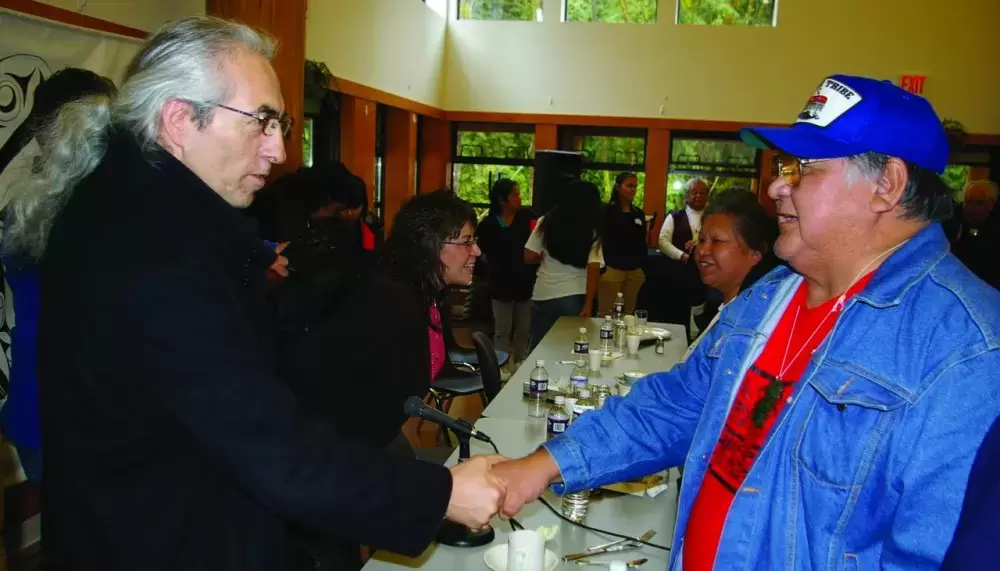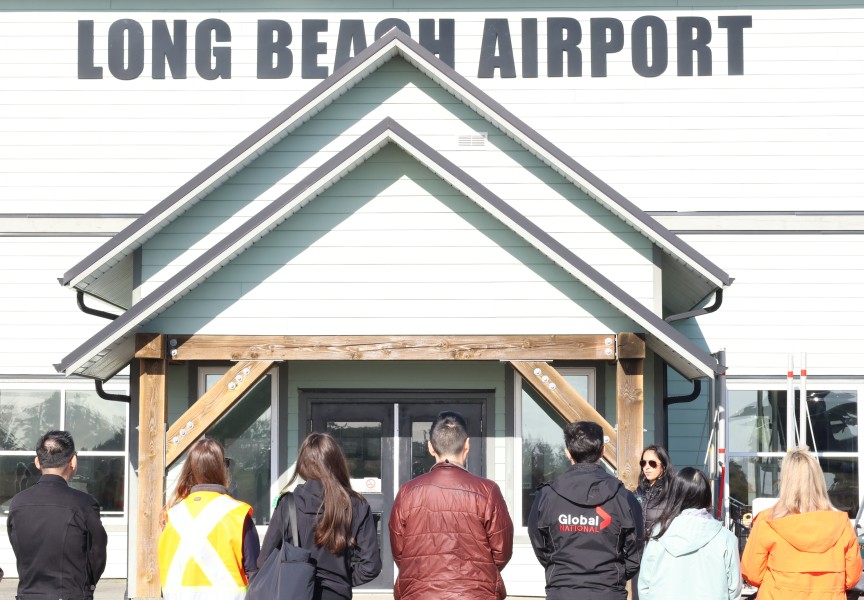The Hupacasath House of Gathering was filled past capacity as a standing-room-only crowd of hundreds gathered to hear about the proposed Residential School Compensation.
“We want to acknowledge those that are here today, but also those who are not; those who have passed away over the past few years,” said Barney Williams Jr. “All of us in this room feel the pain of Residential Schools, in one way or another,” he said.
Survivors came from throughout Nuu-chah-nulth territories and throughout the province to hear Assembly of First Nations (AFN) National Chief Phil Fontaine, who came from Ottawa to speak on the Compensation Agreement-in-Principle.
“It’s about a fair and just resolution to something far too many of us have had to deal with,” said Fontaine, who spent 10 years in the Residential School system. “I was physically abused, I was sexually abused, I was psychologically harmed, and I know what I’m talking about when I’m talking about Residential Schools,” he said. “This issue has been like a plague to many thousands of our people. Remember you’re not alone. There are 15,000 claims before the courts for serious sexual and physical abuses from Residential Schools. There are more than 80,000 survivors still alive, many of them elderly, so there is a sense of urgency in bringing this to a close.”
In November 2004, the AFN conducted a report on the ADR (Alternative Dispute Resolution) process, which the Government of Canada promised would be better than the courts and easier on the survivors. “But it didn’t produce the results we were seeking,” said Fontaine, who recently returned from Israel where he spoke to Jewish leaders about their experiences dealing with oppression. “We needed something better, and those discussions turned into negotiations, which became a political agreement to finally resolve this matter,” he said. “The Agreement in Principle was signed in November 2005, which allows us to bring this chapter of history to a close, turn the page, and move forward as a people. This is one for the ages.”
According to Fontaine, the Agreement-in-Principle (AIP) is just awaiting federal cabinet approval before going to the court for a final seal of approval.
“This is a highly complex, delicate agreement that we’ve worked long and hard for, and I don’t see it being derailed by any government. We’re convinced the Cabinet will approve this deal,” he said, adding the compensation will be “absolutely optional”. “It will not be imposed on anyone, but in our view it is the best option,” said Fontaine.
Charlene Belleau, Manager for the AFN Indian Residential School unit, spoke on the many elements of the Compensation AIP, that will see every Residential School survivor receive a $10,000 Common Experience Payment, plus a further $3,000 for every year spent within a Residential School.
Those who have received settlements through litigation or the ADR process, can still receive the Common Experience Payment (CEP), and all levels of government have agreed they will not claw-back any of the funds, and the CEP will not affect social assistance or pension payments.
The government will set aside $4 billion for compensations, as well as re-starting the Aboriginal Healing Foundation, erecting a national memorial, and making an official apology within the House of Commons.
According to Belleau, the AFN hopes Cabinet approval and early payment to Elders can occur by the end of the month, and notification can be sent out this Spring.
The process will be administered by the federal government through Service Canada, not by AFN.
“No matter what you do, it’s never enough,” said Eugene Touchie. “How do you compensate for the loss of language, the loss of culture, and all the many abuses that happened at those Residential Schools? How much is your language, culture, and your memory of these places worth he asked. I appreciate everything you’ve done in getting this agreement, but I have to say that this settlement is a joke.”
Simon Lucas urged Nuu-chah-nulth to fully support Chief Fontaine and the AIP, to which everyone in the hall stood and applauded to show their support.
“This is not about the money,” said Hugh Watts. “This is about taking responsibility and being united in moving forward, and that’s why I support this,” he said.
Matt Williams spoke about the many healing roads he’s travelled over the past few years, and the many years spent seeking compensation for the abuses he suffered at Christie Indian Residential School.
“Every time a new process starts out I fill out papers and they tell me I have to wait. When the next process starts I’m back at square one, so I fill out more papers and they tell me I have to wait. I’m tired of waiting,” said Williams. “Sure it’s about the money. I need money to buy a new boat motor and maybe have electricity in my house,” he said.
“I want to thank you for coming out to this meeting and telling us your stories,” said Fontaine. “My responsibility is to speak and negotiate on behalf of survivors, 1500 of whom die every year. There is no agreement that is ever a perfect deal that satisfies every person. What we wanted was an agreement that was fair and just, and I believe we got that,” he said. “Every member of our negotiating team is a Residential School survivor. We’ve listened to what survivors have asked us to do and we went out and got it. Sure, we would like to have got a million dollars for everybody but it wasn’t achievable. We got 10 and 3 because it’s practical and achievable, and was better than anything else they, or any other government had offered. It’s a good package. It will make a lot of people happy.”
By David Wiwchar
Ha-Shilth-Sa Reporter







